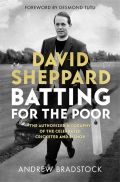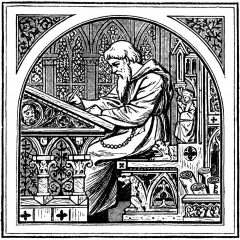The Authorised Biography of the Celebrated Cricketer and Bishop by Andrew Bradstock, SPCK, 348pp, £19.99
In this first authorised biography we meet the man who exchanged a life of privilege and potential sporting greatness, to a life serving the needs of the poor and marginalised in the inner cities, becoming as famous for his achievements in the Church as on the cricket field.

In his foreword to this highly absorbing book by Andrew Bradstock, Archbishop Desmond Tutu writes, during the apartheid years, it meant more than I can say to have a friend like David Sheppard. We, the victims of that system, needed all the help we could get and it was fantastic to have his.
“We realised that we did indeed have friends in high places”.
Archbishop Desmond Tutu
Sheppard’s call to boycott the then all-white South African cricket team over its segregationist policies was a major factor in their eventual removal. By doing so he showed the courage of his convictions, and his belief in a God who hated injustice and challenged people to combat it whatever the risks to personal reputation. With access to over 60 box files of private papers including letters, sermons and articles as well as conducting over 250 interviews with those who knew and worked with him, Bradstock has produced a detailed and critical examination of the life and work of one of the most prominent and recognisable Church figures in recent decades. His twenty-year friendship and ecumenical partnership as Bishop of Liverpool with his Roman Catholic counterpart, Archbishop Derek Worlock, did much to revitalise a city in economic decline in the 1980’s and to get rid of its sectarian reputation as the ‘Belfast of England’. Not for nothing were they dubbed Fish & Chips by the media, for their habit of always being together and never out of the paper!
The book’s thirteen chapters cover his life in time specific periods beginning with his early life from birth in 1929 to public school at Sherborne in Dorset during the war years and immediately after, national service in the Army from October 1947 deferring his starting Cambridge University until 1949 where in November of that year during a Christian Union Mission, he moved away from the mainstream Christian upbringing of his youth and embraced conservative evangelicalism with his commitment to a personal faith in Jesus Christ. Meanwhile in the background his cricketing career was continuing to develop, playing for Sussex County Cricket Club where he made his first-class debut in August 1947, to making his England debut against the touring West Indians in the fourth and final test in 1950 then touring Australia and New Zealand with the MCC, (as England teams were called in those days) in the winter of 1950/51.
Having decided not to follow in his late father’s footsteps with a career in law he opted instead after graduating to undertake ordination training at Ridley Hall Cambridge in October of 1953, having spent the summer captaining Sussex to second place in the county championship that year. The period between 1953-55 covers Sheppard undergoing theological studies as part of his training and where he was encouraged to read afresh the Old Testament prophets like Isaiah and Jeremiah, discovering that they not only spoke of the coming of Christ, but how they also believed in a God who is the side of the poor and exploited. Meeting the real needs of real people was to become Sheppard’s mission upon being ordained. Once again cricket was never very far away and while he may have decided he was prioritising serving God, the Cricket establishment began to tempt him back with a view to leading the 1954/55 tour party to Australia in captaining England in the second and third home tests against Pakistan in 1954. In the event he did not go on tour instead spent a week in December of that year in urban missionary work in Liverpool, a city which was to later become synonymous with his name. His status as a cricketer meant he was often the focus of media attention wherever he went and was often put to use by the Church on occasions when it needed a ‘celebrity Christian.’ Ordained into the priesthood on Michaelmas day September 29th 1955 unbeknown to Sheppard, the presiding Bishop William Wand, had arranged for a press photographer to capture the moment when he handed the famous new curate his holy orders.
The remainder of the book covers the periods where he served his curacy in Islington (1955-57) including his marriage to Grace Issac which also made front page news, his becoming Warden of the Mayflower centre in Canning Town (1958-1969), appointment to Bishop of Woolwich (1969 -1975) and eventual transfer to the city where arguably he made the biggest impact.
His time in Liverpool including the period of his retirement, elevation to the House of Lords and eventual death from cancer in 2005, covers four of the last five chapters of the book and is rich in detail about his work and the alliances he forged not only with Archbishop Worlock, but also with other Church leaders in the city as well as leaders of other faiths. As a Methodist, I was particularly pleased to see the strong relationship forged with Liverpool District Chair, Dr John Newton, being recognised to the extent that very often Sheppard, Worlock and Newton when seen out together became known as the Liverpool Three.
Although largely uncritical in tone, the concluding thirteenth chapter does give some indication of the man behind the public face, including his autocratic tendencies and his reticence to open up fully in his published autobiographies about some of the challenges he and his wife had to overcome. These included her battle with agrophobia not fully overcome until the 1980’s, and surviving ovarian cancer leaving her unable to have more children other than daughter Jenny born in 1962. His high media profile meant he was sometimes seen as aloof and out of touch with his own clergy but for many, David Sheppard was a natural leader possessing that presence which marks those destined to lead in their chosen field. However the author wisely refrains from expressing a point of view about such issues, leaving each reader to judge for themselves instead with the obvious benefit of hindsight.
There are eight pages of photographs including an award winning one taken by Liverpool photographer Stephen Shakeshaft, showing Sheppard and Worlock in their later years both leaning on walking sticks due to illness with the autumnal setting adding a degree of poignancy to two men in the autumn of their own lives.
The final photograph shows Desmond Tutu at the memorial stone to David Sheppard in the south aisle of Liverpool cathedral above where his ashes lie interred along with those of Grace who died in 2010. It features a white Portland stone set into a crater carved into the sandstone wall with two overlapping arms depicting reconciliation, something David Sheppard lived and worked for all his life.
A verse from Jeremiah 29.7 is inscribed on the memorial and provides a fitting epitaph to a man who swapped privilege of social class and upbringing for the privilege of serving the poor and marginalised in God’s Kingdom.
“Seek the welfare of the city where I have sent you – and pray to the Lord on its behalf.”
Andrew Bradstock has written a thoroughly absorbing book about the life of a leader in his chosen fields who achieved much, but never forgot the commitment he made to living out a personal faith in Jesus Christ.
If you can make the time to read this book; you will find it a very worthwhile exercise.

Thank you Michael for your very generous, but fair, review of my book. It’s received a good number of reviews so far, in both the Christian and cricketing press, but I can honestly say this is the most thorough! Thank you again.